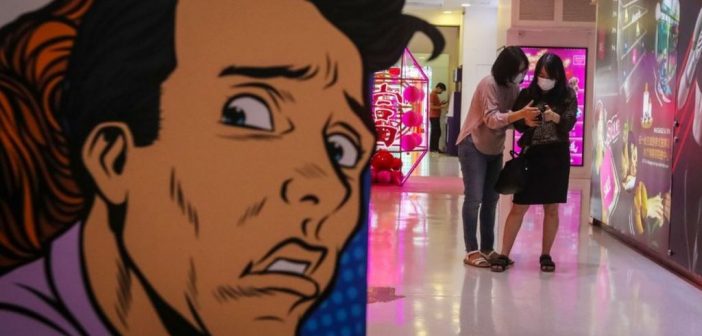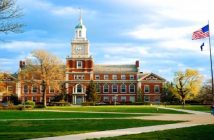There has been a lot of debate about universities reopening, but even if they do, will international students come to the United Kingdom and the United States?
British universities fear that the loss of tens of thousands of Chinese students next year will lead to gaping holes in their budgets, after a survey by the British Council found that only a quarter of those intending to study in the UK were still going ahead.
According to the Higher Education Statistics Agency, the number of Chinese students studying at British universities rose above 120,000 for the first time last year, up from 89,000 in 2014-15. Their tuition fees are a key source of income.
Clearly, though, for those coming to Western universities to study, there will be a challenge: rising Sinophobia like Islamophobia. The media exerts an enormous impact on the rise of Islamophobia on campuses. Now is the time to talk about the Sinophobia and racism that has re-emerged due to the media coverage of the coronavirus.
The excessive media coverage of the coronavirus incites Sinophobia and racism that have real, harmful consequences for current and future Chinese and Asian students in universities.
Sinophobia in the US
In the early days of the US response to the pandemic, President Donald Trump labelled COVID-19 “the Chinese virus”.
The Columbia Daily Spectator reported that “Chinese and Asian students have recently been the target of racist discrimination, including a hateful message in Butler Library and the nametags of two Chinese students, which were affixed to a suite door to identify the residents living there, had been burned in late January in the wake of the coronavirus outbreak”.
A recent Pew Research Center poll showed that about 60% of Americans have an unfavourable view of China. This is an increase of 13% since 2018, according to Pew, and is the “highest unfavourability rating since the poll began”.
UK-based Sinophobia
Anti-Chinese sentiment has been soaring in the UK too. Actually, British Sinophobia has been around for a long time, including during the 1919 anti-Chinese riots in London and Chinese Restaurant Syndrome in the 1960s, a group of symptoms associated with eating food from a Chinese restaurant.
The University of York, hosting 2,000 Chinese students, issued a statement asking for respect and tolerance after xenophobic and racist comments were published on the anonymous confessions page Yorfess in March.
Yinxuan Huang, a sociology research fellow at City, University of London who has been carrying out research among Chinese Christian communities in the UK, supporting Chinese students during the coronavirus crisis, states that: “Almost all incidents they reported were associated with ‘maskaphobia’,” a fear of masks which then triggered racist attacks.
“Most of the victims – some got called ‘virus’ and others got shoved – were wearing masks when attacked. Many Chinese students feel that the issue of the mask is the single biggest culture shock they have ever experienced in the UK. They are now facing a dilemma and have to choose between two bad choices – insecurity [about coronavirus]and fear [of racism].”
A first-year chemistry student at Imperial College London who asked not to be named said: “There’s a lot more fear among Chinese and Asian students than among European students.
“There have been disagreements about whether to wear masks. I think everyone should be wearing them because the symptoms can take 14 days to appear. That’s why they tell people to quarantine for so long.” She added: “Some people are worried about wearing masks because there have been cases of racist abuse.”
Different cultural approaches
The reasons for wearing or not wearing masks might stem from cultural differences and different approaches to combating COVID-19. Neo-liberal communities like the UK and the US initially maintained utilitarian and libertarian ideas in the early stages of the pandemic. In situations such as a pandemic, utilitarianism says that some people may be justly sacrificed for the greater good. It would benefit society to accept casualties, the argument goes, in order to minimise disruption.
There have been objections to wearing masks, social distancing and lockdowns on the libertarian basis that they infringe on individuals’ human rights. Clare Collier, director of advocacy at Liberty, said that legislation “ushered in” in response to the coronavirus was “the biggest threat to civil liberties in a lifetime”.
Some East Asian countries have successfully reduced the number of COVID-19 cases and kept their death rate down during the pandemic. Citizens have worked together to do what is best for the entire community, despite the loss of some personal freedom. Even if some associate communitarianism with authoritarianism, it has clearly been an effective factor in bids to combat the pandemic.
It is relatively common in some Asian countries to wear a face mask to protect against pollution and sickness. In the UK, however, some Chinese immigrants say wearing a mask makes them a target for hate.
Clearly, rising Sinophobia in the UK will affect Chinese and other Far East students’ decisions on whether to study in the UK. In an article published in China Daily, a prestigious Chinese newspaper in English, Mao Junxiang, a professor at and director of the Center for Human Rights Studies at Nankai University in China, stated that “the novel coronavirus can cause epidemic outbreaks which can be contained, but the virus of prejudice will unleash a pandemic of discrimination and political antagonism which will be nearly impossible to control”.
According to a survey by the Beijing Overseas Study Service Association, China’s international education industry is one of the sectors that has suffered most from the pandemic.
The sharp decline in the number of Chinese students studying abroad for the 2020 autumn term could also be associated with increased difficulties in the application process, including visa applications and exit and entry restrictions, high unemployment rates and the current economic problems in China.
Stamp out Sinophobia
Despite the fact that US lawmakers are encouraging major social media platforms – such as Facebook, Google and Twitter – to cooperate in promoting credible information about the virus, their efforts seem to be ineffective. Universities and individual community members must also participate in efforts to curb misinformation and Sinophobia.
Too many Chinese students arrive in the UK without the English language skills to engage more widely with the student community. Too many find themselves lonely and isolated. Too many find solace in sticking with those they know and understand.
International students believe that the UK is a place that values multiculturalism, tolerance, equality, diversity and the rule of law. The growing coronavirus-related racism is truly disturbing.
What can universities do?
As the racial vilification is unlikely to be curbed easily, American and British universities should mull over how they might prevent and address Sinophobia on campus in addition to worrying about reopening and the financial issues stemming from lost international tuition fees.
First, universities should attack prejudice with the facts. The lack of specific knowledge on the coronavirus has culminated in the development of a culture of fear that in turn has ignited the development of irrational and often-racist beliefs.
Universities should therefore hold conferences, deliver leaflets and disseminate correct information about the pandemic in order to counter the misinformation from the media that fuels polarisation.
We also need to reframe the narrative about China and the Chinese. Today, most commentary portrays China as both a security threat and a sinister culture. Universities could celebrate Chinese New Year and promote China-related cultural events in a spirit of inclusion.
Exchange programmes with Chinese universities akin to Erasmus could also enable cultural interaction.
Investing in ethical infrastructure is crucial too. For instance, the University of California, Berkeley has revised the health information it gives students, which now reads: “Be mindful of your assumptions about others” and “Self-awareness is important in not stigmatising others in our community”.
In addition, universities could switch to a more punitive approach to discipline. Columbia University has called on students to report any racist incidents.
Ultimately and above all, we must abandon racial stereotyping. Dr Tedros Adhanom Ghebreyesus, director general of the World Health Organization, said in a recent speech on the dangers of the coronavirus: “The greatest enemy we face is not the virus itself; it’s the stigma that turns us against each other.” ♦




